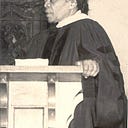“Should I Sacrifice To Live ‘Half-American’”: The Birth of the Double V Campaign
In December of 1941, the United States of America declared war on Japan and officially entered World War II following the bombing of Pearl Harbor. On January 31, 1942, journalist James G. Thompson wrote a letter to the editor of the Pittsburgh Courier, an African American newspaper, on the topic of analyzing the hypocrisy of the military fighting for the rights of people in other countries while denying their fellow citizens those same rights. In his letter Thompson posed questions regarding his citizenship and rights, all while arguing for a Double Victory, meaning a “Double Victory against axis forces and ugly prejudices on the Home Front.”
Thompson’s letter is believed to be the catalyst for the Double Victory Campaign of World War II. The campaign was a way for African American citizens to remind the government that they had been involved in nearly every conflict and war waged in and on this country, yet the government continually refused to acknowledge their roles. On this day, the 82nd anniversary of Thompson’s letter to the editor, we have transcribed the letter and provided it below.
Begin Transcript:
Dear Editor:
Like all Americans my greatest desire at this time, this crucial point of our history, is a desire for complete victory over the forces of evil which threaten our existence today. Behind the desire is also a desire to serve this, my country, in the most advantageous way.
Most of our leaders are suggesting that we sacrifice every other ambition to this paramount one, victory. With this I agree; but I also wonder if another victory could not be achieved at the same time. After all the things that beset the world now are basically the same things which upset the equilibrium of national internally, states, countries, cities, homes and even the individual.
Being an American of dark complexion and some 26 years, these questions flash through my mind: “Should I sacrifice my life to live half American?” “Will things be better in the next generation for the peace to follow?” “Would it be demanding too much to demand full citizenship rights in exchange for the sacrificing of my life?” “Is the kind of America I know worth defending?” “Will America be a true and pure democracy after this war? “Will Colored Americans suffer still the indignities that have been so heaped upon them in the past?” These and other questions need answering: I want to know and I believe every colored American who is thinking, wants to know.
This may be the wrong time to broach such subjects, but haven’t all good things attained by men been secured through sacrifice during past such times of strife?
I suggest that while we keep defense and victory in the forefront that we don’t lose sight of our fight for true democracy at home.
The V for victory signs is being displayed prominently in all so-called democratic countries which are fighting for victory over aggression, slavery and tyranny. If this V sign means that to those now engaged in this great conflict then let we colored Americans adopt the double VV for a double victory. The first V for victory over our enemies from without, the second V for victory over our enemies from within. For surely those who perpetuate these ugly prejudices here are seeking to destroy our democratic form of government just as surely as the Axis forces.
This should not and would not lessen our efforts to bring this conflict to a successful conclusion: but should and would make us stronger to resist these evil forces which threaten us. America could become unified as never before and become truly the home of democracy.
In way of an answer to the foregoing question in a preceding paragraph I might say that there is no doubt that this country is worth defending: things will be different for the next generation: colored America will come into their own, and Americans will eventually become the true democracy it was designed to be. These things will become a reality in time; but not through any relaxation of the efforts to secure them.
In conclusion let me say that though these questions often permeate my mind, I love America and am willing to die for the America I know will someday become a reality.
James G. Thompson
End Transcript
The Double V Campaign, though relatively short-lived, provided an outlet for African Americans to remind the country of the hypocrisy of the war they were fighting and the treatment of African American veterans and service members. The “Double Victory Campaign” gave a new slogan to a generational fight for civil rights and helped lay some of the groundwork for the Civil Rights Movement of the 50s and 60s.
-Kelly Scott, Education Coordinator at the Charlotte Hawkins Brown Museum
More information will be coming soon on the fight of African American activists during World War II as the video series “Seeds of Protest” comes available this spring. The video series, which is a partnership between Fort Fisher State Historic Site and the Charlotte Hawkins Brown Museum, will focus on soldier and educator activism during the second World War as well as the responses to war and the Double V campaign.
Sources
Delmont, Matthew F.. Half American: The Epic Story of African Americans Fighting World War II at Home and Abroad. Viking, 2022.
“James G. Thompson: Originator of the Double V Campaign (U.S. National Park Service).” National Parks Service. Accessed January 27, 2024. https://www.nps.gov/people/james-gratz-thompson-originator-of-the-double-v-campaign.htm.
James Jr., Rawn. The Double V: How Wars, Protest, and Harry Truman Desegregated America’s Military. New York: Bloomsbury Press, 2013.
Thompson, James G.. “Should I Sacrifice to Live ‘Half-American?’”. The Pittsburgh Courier. January 31, 1942. https://www.newspapers.com%2Farticle%2Fthe-pittsburgh-courier-james-g-thompson%2F33240765%2F (accessed January 25, 2024).
